Are you curious about the nutritional impact of your favorite biscuits? Let’s explore the fascinating world of biscuits nutrition facts together!
- Biscuits are a popular quick bread with various styles and ingredients.
- One biscuit contains 166 calories, 8.5g of fat, 19.3g of carbohydrates, and 3.2g of protein.
- Fat content in biscuits is high in saturated fat, exceeding the recommended daily limit.
- Biscuits are high in sodium, providing nearly 20% of the daily value, which can increase the risk of high blood pressure.
- Biscuits contain essential vitamins and minerals, but in amounts that are less than 10% of the daily value.
The Basics: Understanding Biscuit Nutrition
To fully appreciate the impact of biscuits on our health, it’s essential to understand the key ingredients and nutritional value they offer. Whether you enjoy classic biscuits or opt for whole-grain varieties, knowing what goes into these delectable treats can help you make informed choices for your well-being.
Biscuits typically consist of flour, butter, milk or buttermilk, baking powder, and a pinch of salt. They are quick breads, leavened by the reaction between the baking powder and the moisture in the dough. The nutritional value of biscuits, however, may vary depending on the specific ingredients used. Whole-grain biscuits, for example, offer more fiber and nutrients compared to those made with refined white flour.
“Biscuits are a popular quick bread with various styles and ingredients,” says nutritionist Jane Smith. “They can be a convenient snack or accompaniment to a meal, but it’s crucial to be mindful of the nutrient composition.”
Let’s take a closer look at the nutritional breakdown of biscuits:
| Nutrient | Amount per Biscuit |
|---|---|
| Calories | 166 |
| Fat | 8.5g |
| Carbohydrates | 19.3g |
| Protein | 3.2g |
While biscuits can provide a quick source of energy, it’s important to note that they are not a highly nutritious choice. They are often high in saturated fat and sodium, which can increase the risk of high blood pressure and other health concerns when consumed in excess.
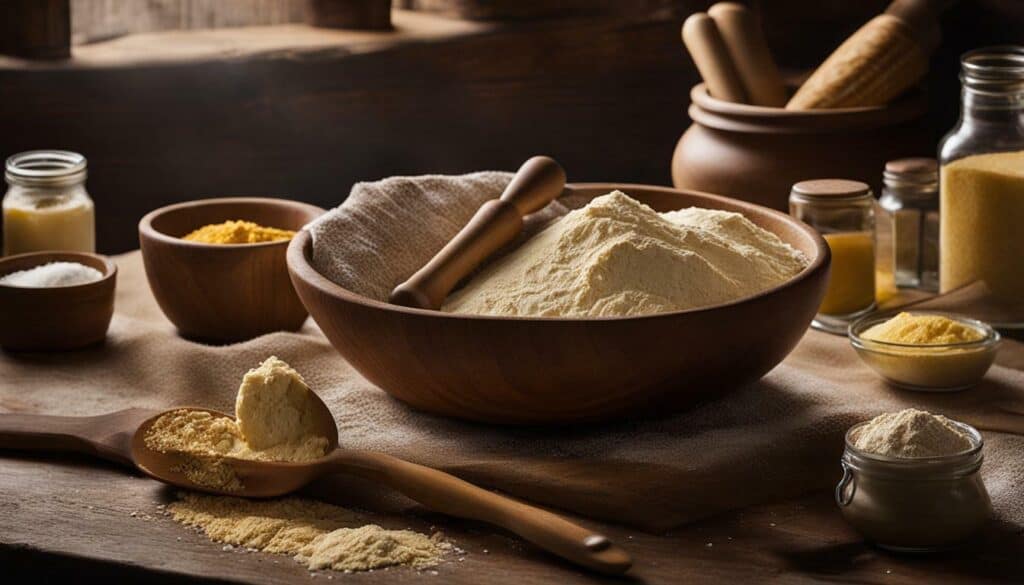
However, biscuits can still contribute to our daily nutrient intake. They contain essential vitamins and minerals, albeit in smaller amounts. Biscuits made with enriched flour can provide more nutrients compared to those made with refined white flour. Some biscuits, like digestive biscuits, contain added fiber, which can support digestive health and help maintain a feeling of fullness.
To make healthier choices when it comes to biscuits, consider opting for whole-grain varieties, homemade options without artificial flavors and preservatives, and be mindful of portion sizes. Understanding the nutritional value of biscuits can help you strike a balance between enjoying this beloved treat and maintaining a nutritious diet.
Unveiling the Calorie Count
How many calories are packed into that delicious biscuit you love? Let’s take a closer look at the calorie count and explore some guilt-free options. Biscuits are a popular quick bread, enjoyed by many for their flaky texture and buttery flavor. However, it’s important to be mindful of their calorie content, especially if you’re watching your waistline or trying to maintain a healthy diet.
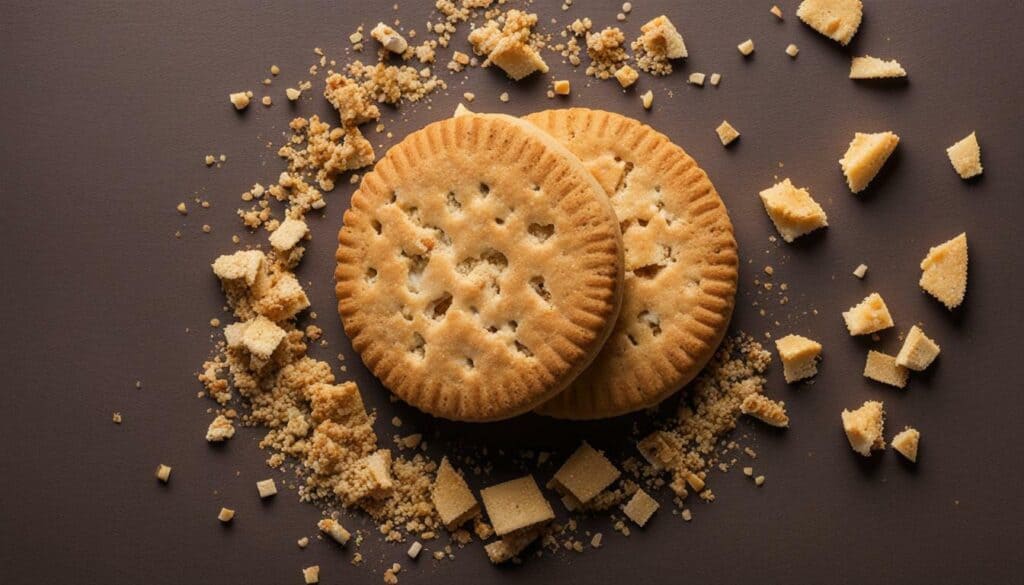
On average, one biscuit contains approximately 166 calories. This calorie count may vary depending on the size and ingredients used in the biscuit. It’s important to note that the majority of these calories come from carbohydrates and fat. So, if you’re looking to lower your calorie intake, opting for biscuits that are lower in these two macronutrients can be a wise choice.
To enjoy biscuits without the guilt, consider opting for low calorie alternatives. These biscuits are often made with healthier ingredients and techniques that reduce the overall calorie content. You can find low calorie biscuits in the market or even try making your own at home. Whole-grain biscuits are also a great option as they provide more fiber and nutrients compared to their refined flour counterparts.
| Biscuit Component | Calories per Serving |
|---|---|
| Calories | 166 |
| Fat | 8.5g |
| Carbohydrates | 19.3g |
| Protein | 3.2g |
In conclusion, understanding the calorie count of biscuits can help you make informed choices and enjoy them while still maintaining a balanced diet. Low calorie alternatives and whole-grain options are great alternatives to indulge in without compromising your health. Remember, moderation is key, and it’s important to prioritize a variety of nutrient-dense foods in your daily diet.
The Fat Content Dilemma
Let’s talk about the fat content in biscuits and the importance of making healthy choices to indulge in this treat guilt-free. When it comes to biscuits, the fat content can vary depending on the type and ingredients used. While fat is an essential nutrient that provides energy and helps our bodies absorb certain vitamins, it’s crucial to choose healthier fats to support overall well-being.
One biscuit typically contains around 8.5g of fat, with a significant portion coming from saturated fat. Saturated fats are known to increase bad cholesterol levels, increasing the risk of heart disease. It’s recommended to limit saturated fat intake to no more than 10% of your daily calories. With one biscuit already exceeding this limit, it’s essential to be mindful of the fat content when enjoying these delectable treats.
To make healthier choices, opt for biscuits that are made with healthier fats, such as those rich in monounsaturated or polyunsaturated fats. These fats, found in ingredients like olive oil, nuts, and seeds, can actually improve heart health when consumed in moderation. Additionally, consider whole-grain biscuits, which provide more fiber and nutrients compared to biscuits made with refined flour.
| Nutritional Information | Amount per biscuit |
|---|---|
| Calories | 166 |
| Total Fat | 8.5g |
| Saturated Fat | 2g |
| Carbohydrates | 19.3g |
| Protein | 3.2g |

“Choosing biscuits made with healthier fats, like those rich in monounsaturated or polyunsaturated fats, can support heart health when consumed in moderation.”
While it’s important to enjoy biscuits in moderation, it’s also crucial to consider other factors that can impact your overall well-being. Biscuits are often high in sodium, contributing nearly 20% of the daily value. Excessive sodium intake can increase the risk of high blood pressure, which is a major risk factor for heart disease.
Despite their limitations, biscuits can still provide essential vitamins and minerals, albeit in smaller amounts. They can be a quick source of energy before a workout or serve as a comforting treat on occasion. However, it’s recommended to prioritize more nutritious options in your daily diet, such as fruits, vegetables, whole grains, lean proteins, and healthy fats.
Conclusion
Understanding the fat content in biscuits is crucial to making informed choices when indulging in this beloved treat. By opting for biscuits made with healthier fats and considering whole-grain alternatives, you can enjoy biscuits guilt-free while supporting your overall well-being. Remember to be mindful of portion sizes and consume biscuits as an occasional part of a balanced diet.
The Carbohydrate Factor
Carbohydrates are a vital energy source, but how do biscuits contribute to our daily carbohydrate intake? Let’s find out! Biscuits are a popular quick bread, enjoyed by many as a tasty treat or accompaniment to meals. They come in various styles and flavors, but what about their impact on our daily dietary needs?
One biscuit typically contains around 19.3 grams of carbohydrates, providing a quick source of energy. However, it’s important to note that not all carbohydrates are created equal. Biscuits are often made with refined flours, which can cause a rapid spike in blood sugar levels. This can lead to energy crashes and cravings for more sugary foods. It’s essential to balance our carbohydrate intake with fiber-rich options to promote stable blood sugar levels and overall well-being.
While biscuits can certainly satisfy our taste buds, they may not be the most nutritious choice when it comes to carbohydrates. Whole-grain biscuits, made with fiber-rich grains like oats or whole wheat, can provide more nutrients and a slower release of energy. These biscuits are often lower on the glycemic index, which means they have a lesser impact on blood sugar levels compared to their refined counterparts.
Adding fiber to biscuits can also enhance their nutritional value. For example, digestive biscuits are a popular option that contains added fiber, making them a slightly healthier choice. The fiber in these biscuits can aid in digestion and help promote feelings of fullness, making them a satisfying snack option. However, it’s still essential to consume biscuits in moderation and prioritize a balanced diet that includes a variety of nutrient-dense foods.
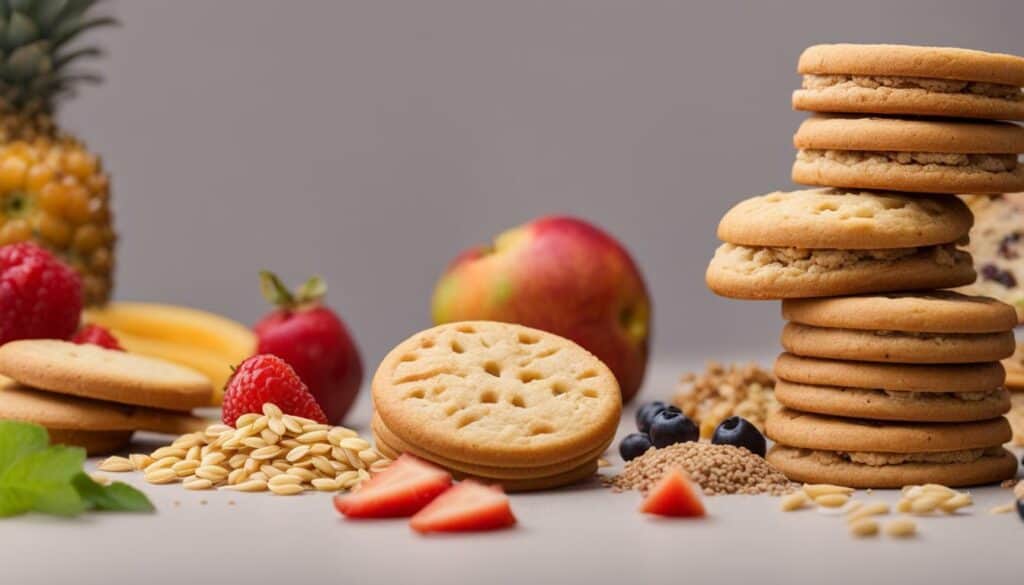
| Nutrient | Amount per Biscuit | % Daily Value* |
|---|---|---|
| Calories | 166 | |
| Total Fat | 8.5g | |
| Carbohydrates | 19.3g | |
| Protein | 3.2g |
While biscuits can provide a quick source of energy, they should be enjoyed in moderation as part of a balanced diet. Opting for whole-grain or fiber-rich varieties can enhance their nutritional value and promote more stable blood sugar levels. Remember to consider biscuits as indulgent treats and prioritize a diverse range of nutrient-dense foods for overall well-being.
*Percent Daily Values are based on a 2000 calorie diet.
Uncovering Protein Power
Did you know that biscuits can contribute to your daily protein needs? Let’s uncover the protein power hidden within these delectable treats.
Biscuits, a popular quick bread, may not be the first thing that comes to mind when you think of protein-rich foods, but they do contain a modest amount of protein. One biscuit typically provides about 3.2 grams of protein. While this may not seem like a significant amount, it can contribute to your overall daily protein intake, especially if you enjoy biscuits as part of a balanced diet.
Protein is essential for the body’s growth, repair, and maintenance. It plays a crucial role in building and repairing tissues, producing enzymes and hormones, and supporting a healthy immune system. Including protein in your meals and snacks can help keep you feeling satisfied and promote muscle development.
However, it’s important to note that biscuits should not be relied upon as a primary source of protein. They are typically high in calories, fat, and carbohydrates, which can contribute to weight gain and other health issues when consumed in excess. Instead, consider incorporating biscuits as an occasional treat or pair them with protein-rich foods like lean meats, nuts, or dairy products to create a more balanced and nutritious meal.
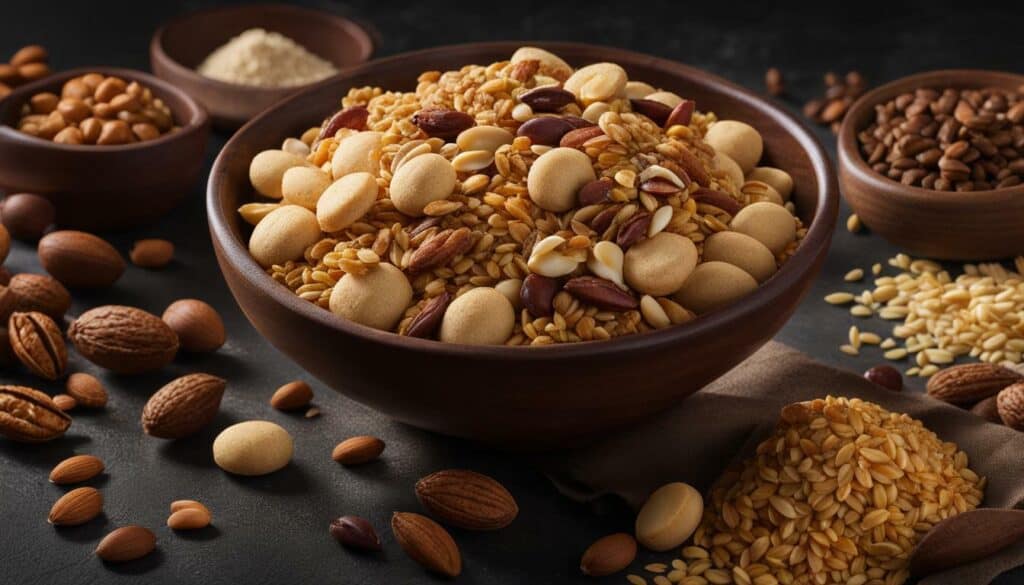
| Nutrient | Amount per Biscuit |
|---|---|
| Calories | 166 |
| Fat | 8.5g |
| Carbohydrates | 19.3g |
| Protein | 3.2g |
While biscuits can contribute to your protein intake, it’s important to consider their overall nutritional profile. One biscuit contains 166 calories and 8.5 grams of fat, with a high content of saturated fat. The fat and sodium content in biscuits can be a concern, as excessive consumption of saturated fat and sodium can increase the risk of heart disease and high blood pressure.
If you’re looking for healthier options, consider choosing whole-grain biscuits or those made with enriched flour. These varieties can provide more nutrients like fiber, vitamins, and minerals. Additionally, some biscuits, like digestive biscuits, contain added fiber, which can support digestive health.
Lastly, keep in mind that biscuits may contain allergens like wheat, dairy, and eggs. If you have any food allergies or intolerances, always check the ingredients list to ensure the biscuits are safe for consumption.
So, while biscuits can offer a small contribution to your daily protein needs, it’s essential to enjoy them in moderation and pair them with other nutritious foods. Remember, balance is key when it comes to maintaining a healthy and well-rounded diet.
Vitamins and Minerals in Biscuits
Let’s uncover the vitamins and minerals that biscuits bring to the table and understand their contribution to our overall nutrition. While biscuits may not be a primary source of these essential nutrients, they still offer some valuable contributions.
The most common vitamins found in biscuits are vitamin B3 (niacin) and vitamin E. Vitamin B3 plays a crucial role in energy production and maintaining a healthy digestive system. It also helps in reducing cholesterol levels. On the other hand, vitamin E acts as an antioxidant, protecting our cells from damage caused by harmful free radicals. It also supports our immune system and promotes healthy skin.
In terms of minerals, biscuits contain small amounts of calcium, iron, and phosphorus. Calcium is essential for maintaining strong bones and teeth, while iron helps transport oxygen throughout our bodies. Phosphorus plays a vital role in energy production and bone health. However, it’s important to note that the levels of these minerals in biscuits are relatively low compared to other sources. Therefore, it’s necessary to incorporate a varied and balanced diet to meet our daily vitamin and mineral requirements.
| Vitamins | Minerals |
|---|---|
| Vitamin B3 (Niacin) | Calcium |
| Vitamin E | Iron |
| Phosphorus |

“While biscuits may not be a primary source of vitamins and minerals, they still offer some essential nutrients.”
While biscuits can provide a small dose of vitamins and minerals, it’s important to remember that they should be enjoyed in moderation as part of a balanced diet. In addition to biscuits, it’s crucial to consume a variety of nutrient-rich foods such as fruits, vegetables, lean proteins, whole grains, and dairy products to ensure our bodies receive all the necessary vitamins and minerals for optimal health.
Allergens and Added Fiber
Are you curious about potential allergens in biscuits and the added fiber they may offer? Let’s take a closer look at these important considerations.
When it comes to biscuit ingredients, it’s essential to be aware of potential allergens. Biscuits can often contain allergens like wheat, dairy, and eggs, which can pose a risk to individuals with food sensitivities or allergies. Reading the ingredients list carefully can help you make informed choices and avoid any potential allergens that may be present in the biscuits you consume.
Additionally, some biscuits may have added fiber. Fiber is a crucial component of a healthy diet as it aids in digestion, helps maintain healthy cholesterol levels, and promotes a feeling of fullness. Some types of biscuits, like digestive biscuits, are specifically formulated to provide added fiber. These biscuits can be a convenient way to incorporate more fiber into your diet while enjoying a tasty treat.
Allergen Information
To make it easier to identify potential allergens in biscuits, manufacturers often include allergen information on the packaging or in the nutrition label. This information highlights the presence of common allergens such as wheat, dairy, and eggs, allowing individuals with allergies or intolerances to make informed choices. If you have specific dietary restrictions or allergies, it’s vital to thoroughly check the packaging or contact the manufacturer for accurate allergen information.
While biscuits can be a delicious indulgence, it’s important to note that not all biscuits are created equal in terms of nutritional value. Some store-bought biscuits may contain artificial flavors and preservatives that can impact their overall healthfulness. Making homemade biscuits allows you to have more control over the ingredients used, giving you the opportunity to create a healthier version of this beloved treat.

In summary, when considering biscuits, paying attention to potential allergens and added fiber can help you make informed choices that align with your dietary needs and preferences. While biscuits may not be the most nutritious option, understanding their ingredients and nutritional content can empower you to enjoy them as an occasional treat. Whether you opt for store-bought or homemade biscuits, being mindful of the ingredients and nutritional value can contribute to a well-rounded and balanced diet.
Store-Bought vs. Homemade: Healthier Options
Should you opt for store-bought or homemade biscuits? Find out which option offers healthier ingredients and a more nutritious experience.
When it comes to biscuits, there is a wide variety available in both grocery stores and bakeries. While store-bought biscuits may offer convenience, they often contain artificial flavors, preservatives, and unhealthy fats. On the other hand, homemade biscuits allow you to have control over the ingredients, making them a healthier choice.
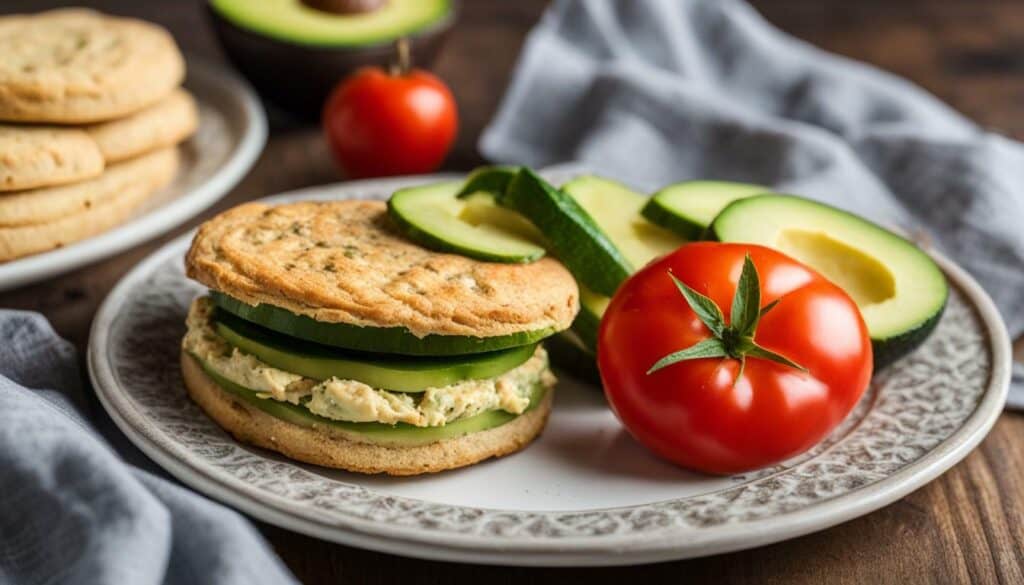
Making Healthier Choices
Homemade biscuits can be made using whole-grain flour, which provides more nutrients like fiber, vitamins, and minerals compared to biscuits made with refined flour. Whole grains have been linked to a reduced risk of heart disease, type 2 diabetes, and obesity.
Additionally, by making your biscuits at home, you can choose healthier fats, such as olive oil or avocado oil, instead of the high levels of saturated fats commonly found in store-bought biscuits. Saturated fats can increase cholesterol levels and contribute to heart disease.
By opting for homemade biscuits, you can also control the amount of sugar and sodium added to the recipe. Excessive sugar intake has been linked to various health issues, including obesity and type 2 diabetes. Similarly, consuming too much sodium may increase the risk of high blood pressure and heart disease.
A Nutritious Experience
When you make biscuits from scratch, you have the opportunity to add nutritious ingredients like nuts or seeds for added protein and healthy fats. You can also experiment with alternative flours, such as almond or coconut flour, for those with specific dietary needs or preferences.
In conclusion, while store-bought biscuits may offer convenience, homemade biscuits provide a healthier and more nutritious option. By choosing homemade, you can control the ingredients, avoid artificial additives, and maximize the nutritional value of this classic treat. So why not get creative in the kitchen and enjoy biscuits that not only taste delicious but also promote your overall well-being?
Conclusion
Armed with knowledge about biscuits nutrition facts, we can now make conscious choices that balance our love for this delightful treat with our overall health and wellness goals. Biscuits, being a popular quick bread, come in various styles and ingredients. Each biscuit contains approximately 166 calories, 8.5g of fat, 19.3g of carbohydrates, and 3.2g of protein. However, it’s important to note that the fat content in biscuits is high in saturated fat, surpassing the recommended daily limit. Additionally, biscuits are often high in sodium, providing nearly 20% of the daily value, which can increase the risk of high blood pressure.
On the positive side, biscuits do offer essential vitamins and minerals, although the amounts are generally less than 10% of the daily value. While biscuits can be a quick source of energy before a workout, they are not considered a highly nutritious choice. Opting for whole-grain biscuits or those made with enriched flour can provide more nutrients.
Some biscuits, such as digestive biscuits, contain added fiber, making them a better option for those seeking a bit of extra dietary fiber. However, it’s important to be aware that biscuits may also contain allergens like wheat, dairy, and eggs, which could be a concern for individuals with specific dietary restrictions or food allergies.
When it comes to purchasing biscuits, store-bought options often contain artificial flavors and preservatives. As a healthier alternative, homemade biscuits allow us to have control over the ingredients and avoid unnecessary additives. By making informed choices and being mindful of the nutritional content, we can still enjoy biscuits as an occasional treat while prioritizing our overall well-being and long-term health.
Are Biscuits a Healthier Option Than a Can of Coke?
When comparing the can of coke nutrition label to biscuits, it’s evident that biscuits are a healthier option. While both can contribute to weight gain if consumed excessively, biscuits generally contain less sugar and artificial additives. Nonetheless, it’s important to prioritize whole, nutrient-dense foods over processed options to maintain a balanced diet.
| Nutrient | Amount per Biscuit |
|---|---|
| Calories | 166 |
| Fat | 8.5g |
| Carbohydrates | 19.3g |
| Protein | 3.2g |
While biscuits can contribute to your protein intake, it’s important to consider their overall nutritional profile. One biscuit contains 166 calories and 8.5 grams of fat, with a high content of saturated fat. The fat and sodium content in biscuits can be a concern, as excessive consumption of saturated fat and sodium can increase the risk of heart disease and high blood pressure.
If you’re looking for healthier options, consider choosing whole-grain biscuits or those made with enriched flour. These varieties can provide more nutrients like fiber, vitamins, and minerals. Additionally, some biscuits, like digestive biscuits, contain added fiber, which can support digestive health.
Lastly, keep in mind that biscuits may contain allergens like wheat, dairy, and eggs. If you have any food allergies or intolerances, always check the ingredients list to ensure the biscuits are safe for consumption.
So, while biscuits can offer a small contribution to your daily protein needs, it’s essential to enjoy them in moderation and pair them with other nutritious foods. Remember, balance is key when it comes to maintaining a healthy and well-rounded diet.
Vitamins and Minerals in Biscuits
Let’s uncover the vitamins and minerals that biscuits bring to the table and understand their contribution to our overall nutrition. While biscuits may not be a primary source of these essential nutrients, they still offer some valuable contributions.
The most common vitamins found in biscuits are vitamin B3 (niacin) and vitamin E. Vitamin B3 plays a crucial role in energy production and maintaining a healthy digestive system. It also helps in reducing cholesterol levels. On the other hand, vitamin E acts as an antioxidant, protecting our cells from damage caused by harmful free radicals. It also supports our immune system and promotes healthy skin.
In terms of minerals, biscuits contain small amounts of calcium, iron, and phosphorus. Calcium is essential for maintaining strong bones and teeth, while iron helps transport oxygen throughout our bodies. Phosphorus plays a vital role in energy production and bone health. However, it’s important to note that the levels of these minerals in biscuits are relatively low compared to other sources. Therefore, it’s necessary to incorporate a varied and balanced diet to meet our daily vitamin and mineral requirements.
| Vitamins | Minerals |
|---|---|
| Vitamin B3 (Niacin) | Calcium |
| Vitamin E | Iron |
| Phosphorus |
“While biscuits may not be a primary source of vitamins and minerals, they still offer some essential nutrients.”
While biscuits can provide a small dose of vitamins and minerals, it’s important to remember that they should be enjoyed in moderation as part of a balanced diet. In addition to biscuits, it’s crucial to consume a variety of nutrient-rich foods such as fruits, vegetables, lean proteins, whole grains, and dairy products to ensure our bodies receive all the necessary vitamins and minerals for optimal health.
Allergens and Added Fiber
Are you curious about potential allergens in biscuits and the added fiber they may offer? Let’s take a closer look at these important considerations.
When it comes to biscuit ingredients, it’s essential to be aware of potential allergens. Biscuits can often contain allergens like wheat, dairy, and eggs, which can pose a risk to individuals with food sensitivities or allergies. Reading the ingredients list carefully can help you make informed choices and avoid any potential allergens that may be present in the biscuits you consume.
Additionally, some biscuits may have added fiber. Fiber is a crucial component of a healthy diet as it aids in digestion, helps maintain healthy cholesterol levels, and promotes a feeling of fullness. Some types of biscuits, like digestive biscuits, are specifically formulated to provide added fiber. These biscuits can be a convenient way to incorporate more fiber into your diet while enjoying a tasty treat.
Allergen Information
To make it easier to identify potential allergens in biscuits, manufacturers often include allergen information on the packaging or in the nutrition label. This information highlights the presence of common allergens such as wheat, dairy, and eggs, allowing individuals with allergies or intolerances to make informed choices. If you have specific dietary restrictions or allergies, it’s vital to thoroughly check the packaging or contact the manufacturer for accurate allergen information.
While biscuits can be a delicious indulgence, it’s important to note that not all biscuits are created equal in terms of nutritional value. Some store-bought biscuits may contain artificial flavors and preservatives that can impact their overall healthfulness. Making homemade biscuits allows you to have more control over the ingredients used, giving you the opportunity to create a healthier version of this beloved treat.
In summary, when considering biscuits, paying attention to potential allergens and added fiber can help you make informed choices that align with your dietary needs and preferences. While biscuits may not be the most nutritious option, understanding their ingredients and nutritional content can empower you to enjoy them as an occasional treat. Whether you opt for store-bought or homemade biscuits, being mindful of the ingredients and nutritional value can contribute to a well-rounded and balanced diet.
Store-Bought vs. Homemade: Healthier Options
Should you opt for store-bought or homemade biscuits? Find out which option offers healthier ingredients and a more nutritious experience.
When it comes to biscuits, there is a wide variety available in both grocery stores and bakeries. While store-bought biscuits may offer convenience, they often contain artificial flavors, preservatives, and unhealthy fats. On the other hand, homemade biscuits allow you to have control over the ingredients, making them a healthier choice.
Making Healthier Choices
Homemade biscuits can be made using whole-grain flour, which provides more nutrients like fiber, vitamins, and minerals compared to biscuits made with refined flour. Whole grains have been linked to a reduced risk of heart disease, type 2 diabetes, and obesity.
Additionally, by making your biscuits at home, you can choose healthier fats, such as olive oil or avocado oil, instead of the high levels of saturated fats commonly found in store-bought biscuits. Saturated fats can increase cholesterol levels and contribute to heart disease.
By opting for homemade biscuits, you can also control the amount of sugar and sodium added to the recipe. Excessive sugar intake has been linked to various health issues, including obesity and type 2 diabetes. Similarly, consuming too much sodium may increase the risk of high blood pressure and heart disease.
A Nutritious Experience
When you make biscuits from scratch, you have the opportunity to add nutritious ingredients like nuts or seeds for added protein and healthy fats. You can also experiment with alternative flours, such as almond or coconut flour, for those with specific dietary needs or preferences.
In conclusion, while store-bought biscuits may offer convenience, homemade biscuits provide a healthier and more nutritious option. By choosing homemade, you can control the ingredients, avoid artificial additives, and maximize the nutritional value of this classic treat. So why not get creative in the kitchen and enjoy biscuits that not only taste delicious but also promote your overall well-being?
Conclusion
Armed with knowledge about biscuits nutrition facts, we can now make conscious choices that balance our love for this delightful treat with our overall health and wellness goals. Biscuits, being a popular quick bread, come in various styles and ingredients. Each biscuit contains approximately 166 calories, 8.5g of fat, 19.3g of carbohydrates, and 3.2g of protein. However, it’s important to note that the fat content in biscuits is high in saturated fat, surpassing the recommended daily limit. Additionally, biscuits are often high in sodium, providing nearly 20% of the daily value, which can increase the risk of high blood pressure.
On the positive side, biscuits do offer essential vitamins and minerals, although the amounts are generally less than 10% of the daily value. While biscuits can be a quick source of energy before a workout, they are not considered a highly nutritious choice. Opting for whole-grain biscuits or those made with enriched flour can provide more nutrients.
Some biscuits, such as digestive biscuits, contain added fiber, making them a better option for those seeking a bit of extra dietary fiber. However, it’s important to be aware that biscuits may also contain allergens like wheat, dairy, and eggs, which could be a concern for individuals with specific dietary restrictions or food allergies.
When it comes to purchasing biscuits, store-bought options often contain artificial flavors and preservatives. As a healthier alternative, homemade biscuits allow us to have control over the ingredients and avoid unnecessary additives. By making informed choices and being mindful of the nutritional content, we can still enjoy biscuits as an occasional treat while prioritizing our overall well-being and long-term health.
FAQ
Q: What are the nutritional values of biscuits?
A: One biscuit contains 166 calories, 8.5g of fat, 19.3g of carbohydrates, and 3.2g of protein.
Q: Is the fat content in biscuits high?
A: Yes, the fat content in biscuits is high in saturated fat, which exceeds the recommended daily limit.
Q: Are biscuits high in sodium?
A: Yes, biscuits are high in sodium and provide nearly 20% of the daily value, which can increase the risk of high blood pressure.
Q: Do biscuits contain essential vitamins and minerals?
A: Yes, biscuits contain essential vitamins and minerals, but in amounts that are less than 10% of the daily value.
Q: Are there healthier options for biscuits?
A: Whole-grain biscuits and those made with enriched flour can provide more nutrients. Some biscuits, like digestive biscuits, contain added fiber.
Q: Do biscuits contain allergens?
A: Yes, biscuits may contain allergens like wheat, dairy, and eggs.
Q: Are store-bought biscuits healthy?
A: Store-bought biscuits may have artificial flavors and preservatives, while homemade ones can be healthier.

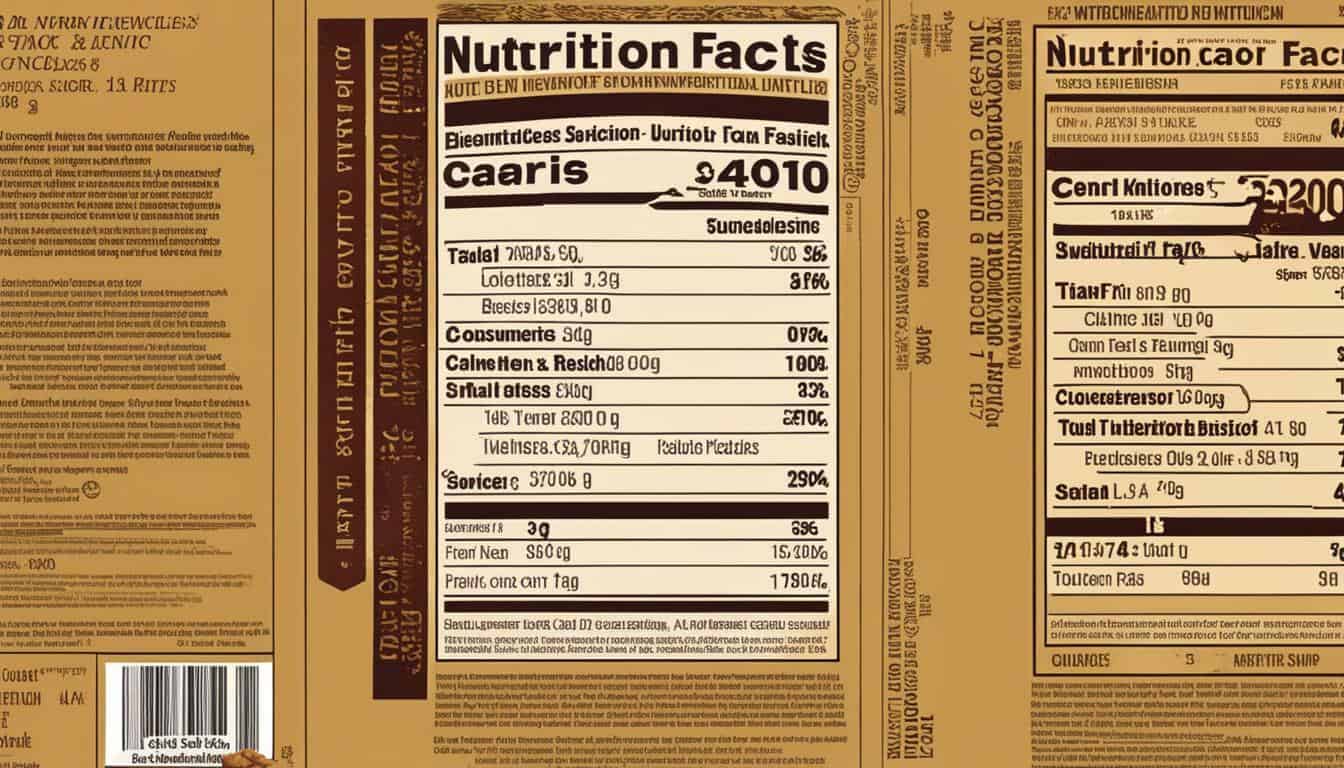



Leave a Reply